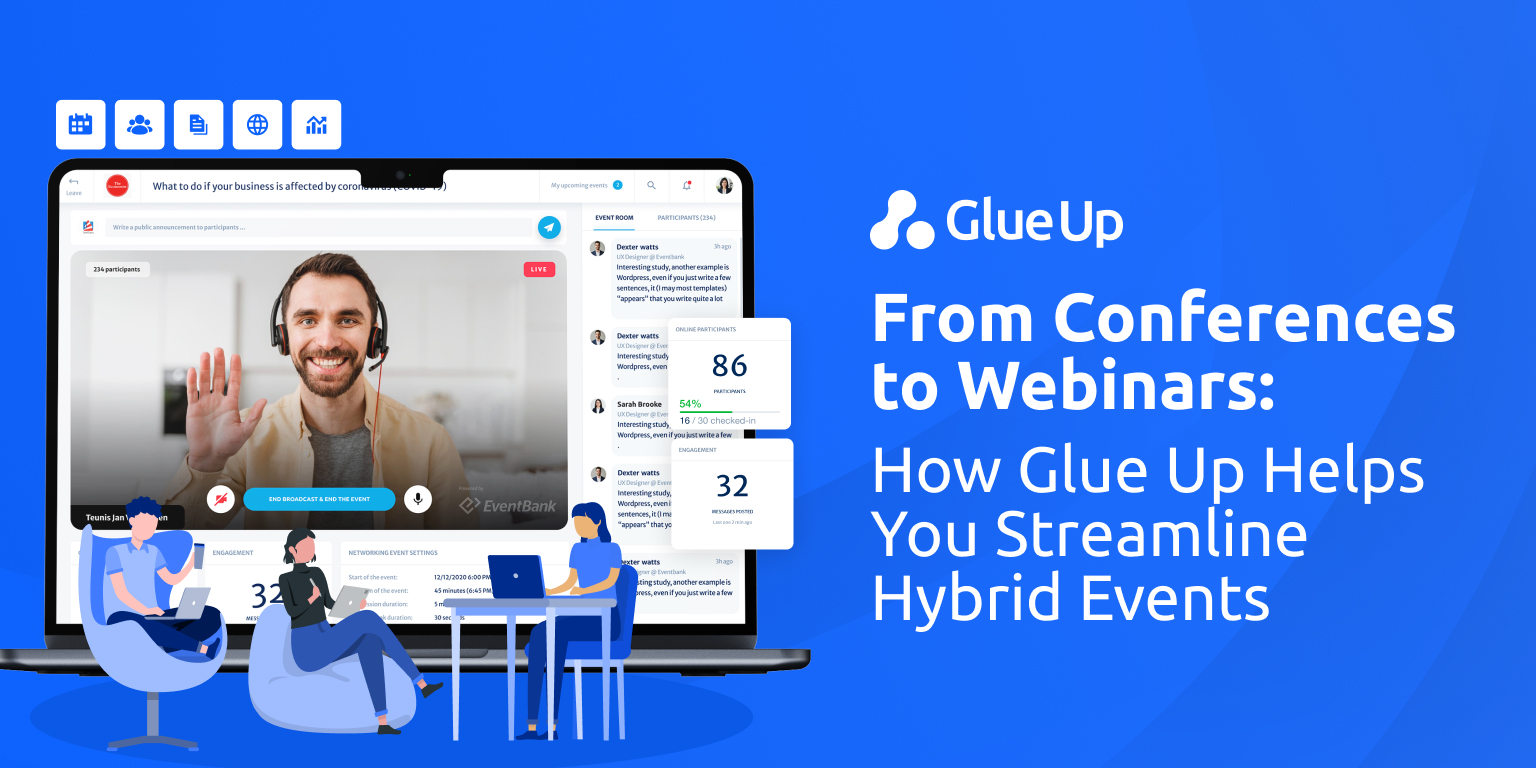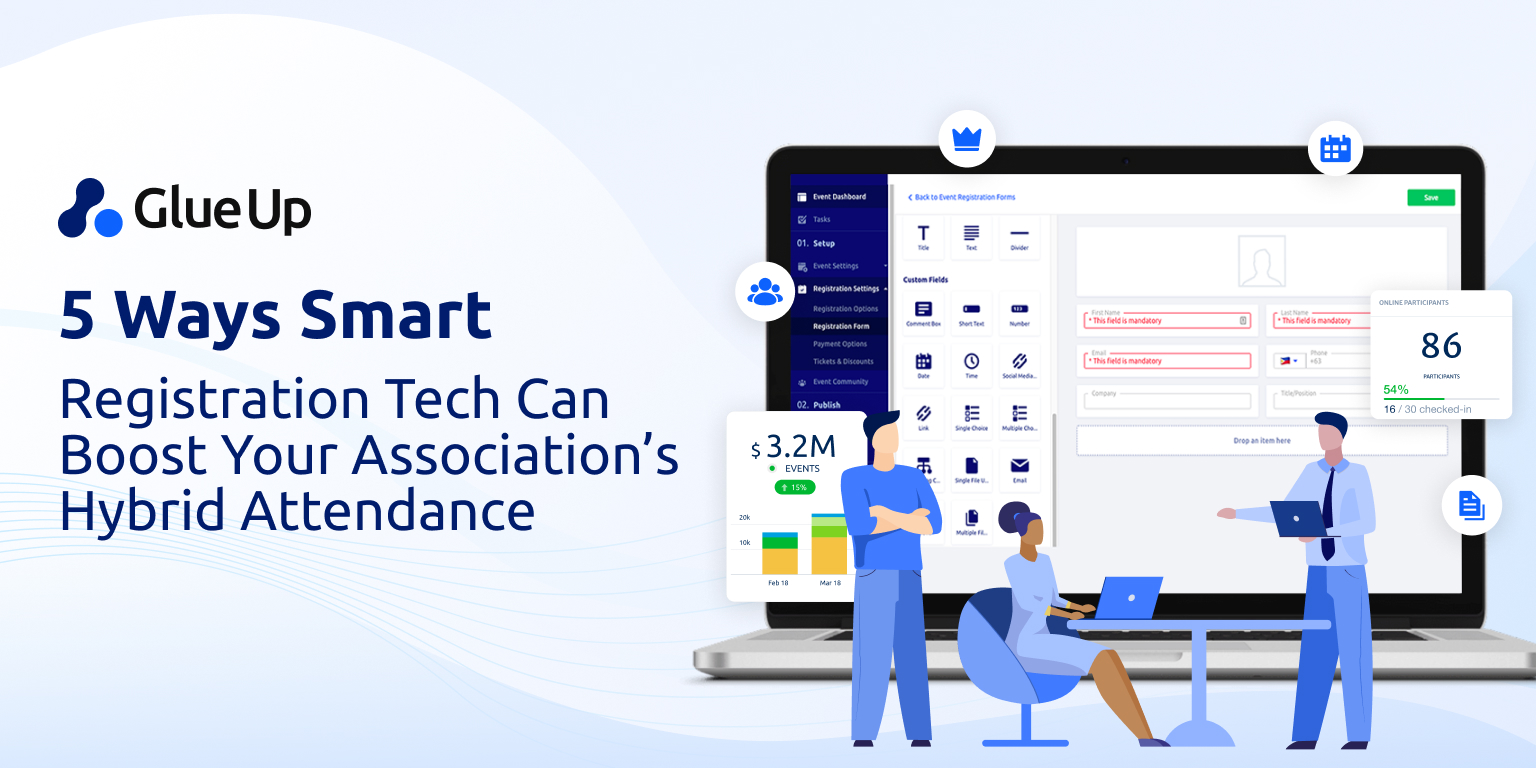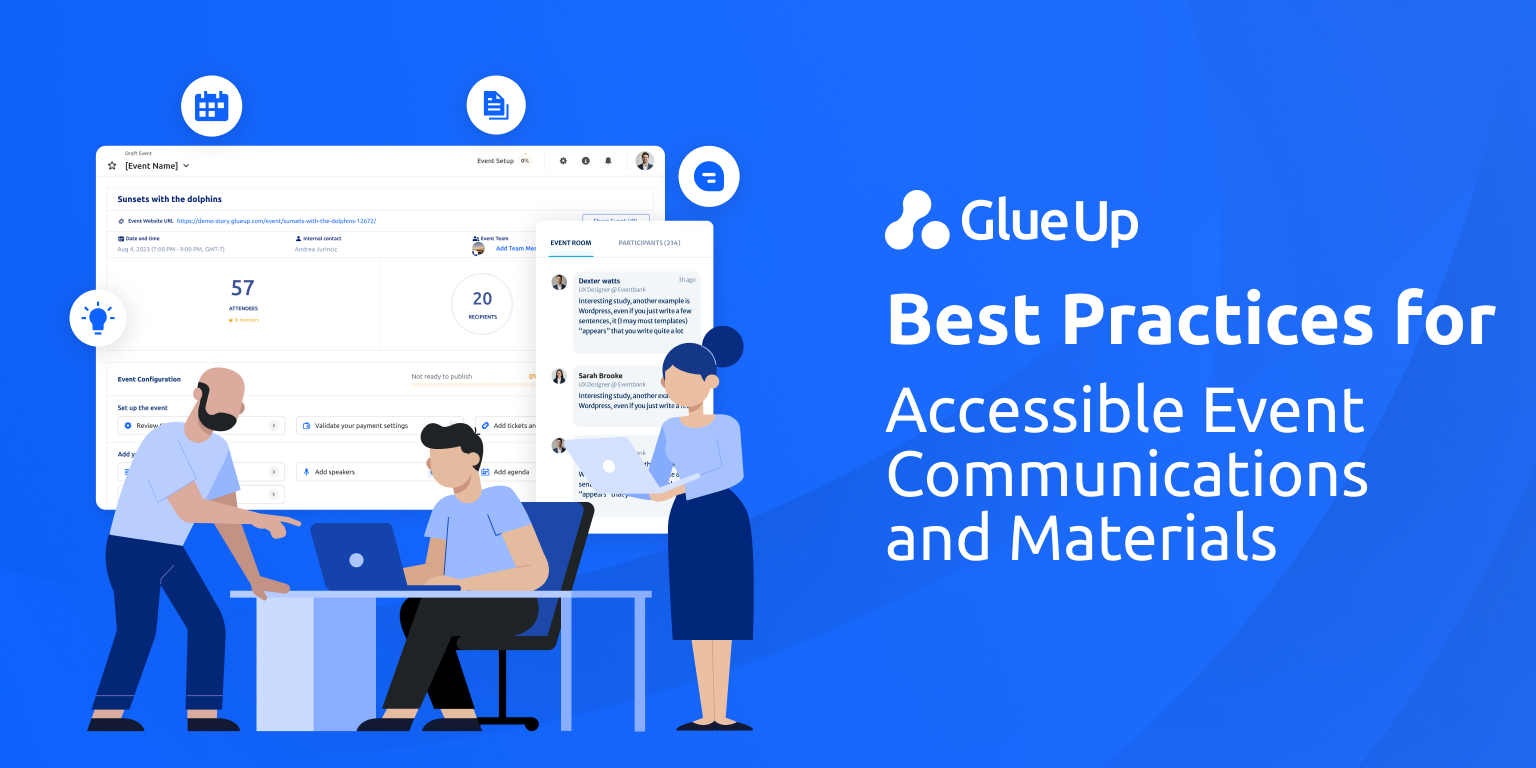
98% of consumers feel more inclined to purchase after attending an event.
2019 is going to be an interesting year for event planning. New tech is driving more and more interest, trade shows are picking up pace outside of China for once, and the world of event management is getting easier and easier. Though, while easy to shop for tools online, event planning can be a tricky business that if you haven't mastered the first steps in organizing your event, those software tools just won't be of any help to you.
Chances are you're looking to plan the perfect event for 2019, and we'll get you the best possible checklist so you can do just that. With years of event planning and management under our belt, Glue Up really does know what it takes to get an amazing event off the ground and talked about for years. We'll show you the ropes of event planning in the 2019 era, and then we're going to show you how to make sure you achieve the growth you want.
Buckle up.
Table of Contents
- Event Topic and Goals
- Creating Attendee Personas
- Budgeting
- Choosing a Venue
- Marketing Your Event
- Know Your Equipment
- Gather Vendors
- Registration and Ticketing
- Post-Event Marketing
- Downloadable Event Planning Checklists
1. Set Your Event Topic and Goals
Choose an appropriate topic for your event. It's that simple....or is it?
While industry-related events are easy to come up with for topics, you'll realize soon enough you aren't the only apple in the bunch that's going to host an event related to your industry. So you not only need to choose a topic related to your industry, but it has to blow your competition out of the water. Unfortunately, there is not much breathing room for an event's medium. It'll have speakers, round tables, discussions, Q&As, Tabling, and a few other engagement related activities.
To make the most of your event, make sure the topic is relevant to the industry and up-to-date. You wouldn't want to be hosting a FinTech summit and completely avoid cryptocurrencies in your activities and discussions. You'd be missing out completely on what's in the news and the talking points of your industry. Do your due diligence and make the most out of your audience's curiosities. It's ok to be a little off-topic if it means driving interest as well, what you're looking for is a way to get people talking about your event.
Set a Goal

What's the goal of your event? Is it ROI? (We certainly hope it is). Engagement? Networking? Even Free events have some sort of value in mind, even if it's not directly from ticket sales, make sure your audience provides your organization value in some way. Possibly by subscribing to newsletters, sharing the event on social media, and other tertiary ways of giving you value. That means revolving your event around ways your audience can engage with you, their fellow attendees, vendors, speakers, and most importantly, people outside of the event.
ROI Goals - Goals that revolve around a real dollar ROI are simple in the conversion performance. How many tickets do you need to sell before you can pay the event off, and then-some? These types of goals can serve dual purposes like increasing engagement and so on, but with a paid ticket in mind, the content, goods, or services you're providing need to be enough to make attendees happy.
Engagement Goals - Engagement goals are tertiary goals that have everything to do with getting your name out there or setting your organization up to be the leader of your industry. This means making your event set up so that attendees feel the need to tell others how great it is. Essentially it's just a big PR or marketing event. These can be paid, but it's best to leave them free to drive as much foot traffic as possible, or as much as your venue will allow.
Networking Goals - Networking events are typically smaller, though they don't have to be, due to the more personal nature of the event. Like a mixer or a round table discussion, these events focus on providing value to your attendees by getting them face to face with their peers or leaders in their industry they would otherwise never meet outside of your event. This goal benefits you as you'll become the go-to host for networking services and can both be an engagement goal or money goal facilitator.
And you know what? Sometimes your event might just want to meet all these goals and more. And that's alright.
The best thing for you to do now is to figure out who your audience is that matches your Topic and Goal.
2. Create an Audience/Attendee Persona

This one is more of a marketing best practice, but it certainly fits nicely within event planning. So what's a persona? A persona is a make-believe attendee who embodies your attendee's core traits, wants, demographics, and skills.
Let's practice.
You're a CPA firm in New York who's looking to host an event for accounting students so you can drive a new recruitment initiative. Your goal here is to be networking. The event should be free and accessible. So how's your attendee persona?
We'll name them Accounting Alex.
Alex is around 21-24 years old, a university senior, or recent graduate. Alex should be located in New York or New Jersey. Alex should be a CPA holder or in the process of receiving their CPA.
That's a pretty good persona already. There can be much more related topics added to your attendee persona to help round out your audience. You can also add multiple different personas to the table. For instance, you can add Finance Frank for students who are Finance related but may switch to an accountant role for their career. Thusly you would create a persona for that person as well. Personas help with targeting your audience down to key areas and help you advertise to specific groups of potential attendees, even at the digital level.
3. Event Budget Planning

Now that you know your audience, your topic, and your goals, use this info to budget around them. Here's what you should factor in: Venue, A/V, Marketing, Swag, Vendors, and Furnishing.
It's tough for us to give you the exact weight each of these factors brings to the budgeting table. It all really depends on your audience and what works best for them. If your audience is looking for being engaged with each other, put more budget into venues and furnishing. Is your event product-related? Throw more budget at A/V, Swag, and Marketing. Is the event more about the experience of being there? Give your Venue and Vendors a larger chunk of the pie.
4. Planning Your Venue and Event Date

The Venue and Date are the only things you really need before you can get started telling everyone about it. So let's get that out of the way.
The Venue
Now that you know what kind of budget you're looking to work with, it's time to hunt for a good venue. With your expected number of attendees, make sure the venue has all the necessary space required and is easily accessible for anyone to get to. The space also needs to be a reflection of your event's activities. Make sure there are divisions for break out areas, tabling, open spaces for talks, seats for attendees weary of standing all day (a must-have if you ask us).
Double-check data services to make sure there's a strong signal, but even if there is, always provide WiFi at the venue. Nothing makes the digital age of event attendees happier than WiFi. Event planning revolves around making sure the venue is comfortable and easy to manage, so first try searching for venues that specialize in hosting events often, as they're quite pliable when it comes to changing circumstances.
The Date
Choosing the date is a simple task but extremely key to your event's success. Simply do some research and make sure there are not other events related to yours in the vicinity. If there are, avoid those dates within 30 days of the other event to avoid splitting your audience or entering a marketing war.
OR
You could host your event nearby the day before or after the other event. That way attendees can attend both events within a short time-frame. Only do this if your events are in the same industry but the topics vary wildly so as not to conflict with each other. This could also open up great opportunities for co-sponsored events with other change-makers, lightening everyone's load.
Potentially you could even reach out to do a joint event, increasing your promotion reach. Having a partner helping in the event planning process takes a lot of pressure off your shoulders, so it's something we always suggest.
5. Marketing Your Event
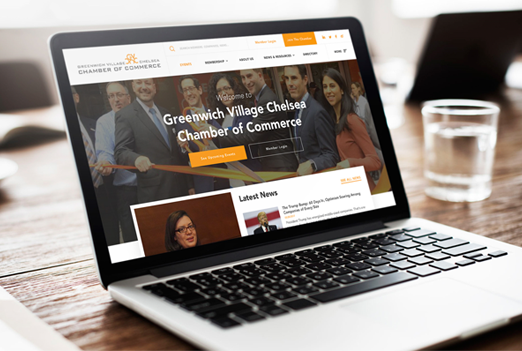 Check it out.
Check it out.
Event Email Marketing

This is where that attendee list comes in handy. Attendees should be engaged before they arrive. you want to make sure that they are excited about the event so much so that they invite their friends and colleagues too. There's no harm in informing and surprising your attendees before they arrive.
Email marketing is also a great way to convert lists you might already have on hand. Use automation to make your life easier as you schedule emails to go out monthly if you're months away from the event, and weekly in the 5 weeks prior. Use this chance to inform and educate attendees about the event for a really smooth sign in and orientation process. We even made a list of some great email campaign ideas to use in your next event email campaign.
6. Know Your Equipment Needs

These days going digital means also bringing digital to your event as much as it means bringing your organization to the internet. No matter how traditional your event is, using the right equipment and technology at your event could make or break your impact on your attendees. This can be using multiple flat panel screens and projectors so audiences at talks can see the speaker from any distance, recording and live streaming the event for remote audiences, printing out “smart” IDs, and more.
In fact, the most important tech investments are those examples we just gave. If you can record the event and share it, make it easier for attendees to see and hear speakers, and easier for them to sign in, the whole event just went from B to A+. Do some research on the tools necessary, rent screens, microphones, recording equipment, any and all A/V you need. Or hire an outside entity to do it for you (the easiest approach).
Event planning depends on proper facilitation for speakers and attendees to enjoy activities held in the event, so it's important to know where the equipment's role is at every level, from registration to speaking.
7. Gather Vendors
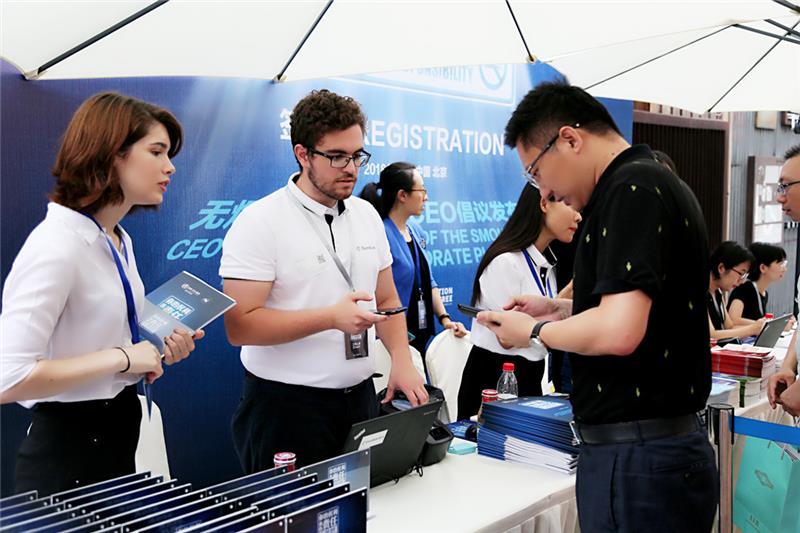
Getting your event to the next level, we're talking A++ now.
Vendors are going to make the difference between a good event, and a great event. You could possible staff your event entirely at all levels, but vendors have the resources and the manpower to get it done both effectively, and professionally. That means catering, sign in & queuing A/V management, and more. Not only this but if your event is networking or product-focused, this is a good time to allow vendors to promote and sell their products and services at tables outside or surrounding the event area.
Vendors are a great way to leverage interests from your audience and allow for some padding for your organization to stuff swag bags, promote other offers, and negotiate mutually beneficial marketing agreements so you can have your vendors promote the event as well.
One other thing is that vendors extend to outside the event as well. If you're expecting a bunch of outside fly-in attendees, try to make some deals with the local hotels for pricing discounts, and transportation from hotel to the event doesn't hurt as well.
8. Registration and Ticketing
The Registration process is one of the most important aspects of your event that should be taken seriously from the beginning. This is the first impression of the event for your attendees and if this is run poorly, then they're just going to complain. I do it. You do it. We all do it. No one likes standing in line for a simple sign-in procedure.
The first place registration begins is online. This ties into your web presence, even if you don't outright own your own piece of the web for your event. Event third-party ticketing sites do wonders, as you can expect attendees to bounce from the event if they show up and realize the entire line at the door is waiting to pay, making it a slow-moving process.
The best way to get this process as painless as possible is to move it to become more digital of course. Doing so allows the ticketing process to be completed before the event even starts. This also allows for quick bar code and QR code scanning to confirm the registration long before you have to break out a list and search for their name, something I consider a cardinal sin among event planners. It's easy to achieve this these days with literally any event management tool or platform, so shop around for the one that works for you, we suggest anything with app support to facilitate self-service tablet registrations at the door.
The fewer folks you have waiting to buy a ticket on the day of the event, the better. There's a lot that can be done to make registration easier, so here's a list.
- Create 2 registration lines, one for same-day ticket purchases and registrants, and one for online event ticket purchases. The online registrants lines should only consist of 1 or 2 steps to expedite the process, 1 for scanning their bar code/QR code, and optionally another step for collecting their badge/receive bracelet. Having 2 separate lines will make it so same-day ticket purchasers feel as though they should have registered online, allowing for more online registrants for follow-up events.
- Ensure a strong WiFi connection, or have an offline sign up backup plan. Make sure attendees who lose connection, or forget their ticket/log in info, have a way to register by checking their name on a list. If a registrant forgets his information, or has lost connection to the registration app/website, bring that person out of the line and to a customer service table for checking their name on a list.
- Set up FAQ lines that answer questions for attendees early on to prevent unnecessary questions at the registration table, holding up the line.
- If you have the budget, set up self-serve registration tablets separate from the other registration lines, to further free up line clog and staff.
- Offer free pamphlets and brochures to attendees or potentials waiting in line to purchase. Providing a schedule of events going on that day with special offers inside, for instance discounts on purchases with a vendor via said brochure, you can then guarantee more purchases.
- Get an overabundance of stationery like pens, sharpies, paper, etc. Don't ever be caught with your pants down.
- As a rule of thumb, set up one registration line per 100 guests, this will bring the wait time down to below 10 minutes per guest.
- Work with your vendors to create swag bags that attendees can pick up right after they sign in. It's a great way to please a guest and gives you ample opportunity to stuff each person with marketing materials and goodies that will leave the event eventually and start spreading around. I also suggest T-shirts as they're great re-usable swag that might catch someone's attention.
At Glue Up we really do take the registration and ticketing process seriously, it's the icing on the cake of event planning and management. It's the make or break it portion of an event, and it just so happens it's the first step for all attendees engaging with you. Check out our product features for handling event ticketing to learn more.
9. Post-Event Marketing
Once the event is over, the value doesn't stop there. With all the registrations and attendees, you've now likely got a sizable list of contacts. Depending on the goal of your event, there's likely going to be value in you reaching back out to these attendees.
They're engaged already and they've experienced your events. Now is the best time to use a social media and email campaign to call these people to action to help give feedback, share their experiences, photos, or videos, and reach out to them again later for future events.
Oh, and send them a survey of course. Get some feedback to make your next event even better!
10. Event Planning Checklists
To help simplify the process for you, we've created 3 separate checklists for small, medium, and large events.
That's a Wrap
Event planning is a long and arduous process. It's something that happens likely only a few days out of the year and it's your job to make sure you stuff as many engaged bodies into the space as possible so you can make a splash.
Each year that goes by shows new and better tools coming to the rescue, but with that in mind, some hosts are forgetting the basics. What we gave here were the basics....but we strive to make sure that there is some way these steps plug into a tool that makes your organization more digital.
And going more digital means growing and scaling bigger and better than ever before. Event planning is catching up with the modern age and so should your organization.
If you're looking for a platform that helps you create event webpages, send emails, ticket, and manage attendees, click here to book a demo of Glue Up Platform and learn how Glue Up 's all-in-one event solution is the answer to all of your event planning and management needs. Back to Top.

